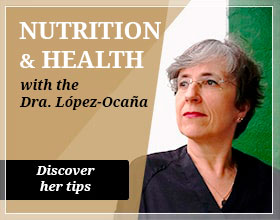We frequently hear the terms prebiotics and probiotics, and today we are going to make a brief description of what they are and how important they are for our intestinal flora. In addition, we will see how we can contribute both probiotics and prebiotics to our body through food.
First, we are going to define the microbiota as the set of microorganisms (bacteria, viruses, fungi) that are located in the human body. In the case of the human body, the best known is the intestinal microbiota or intestinal flora. It has been shown that these microorganisms are very beneficial for health: for the development of the immune system and for the mood (curiously, the highest production of serotonin occurs in the intestine). We also know that there is a relationship between the intestinal microbiota and obesity or digestive problems, such as an irritable colon.
Related to the intestinal microbiota we find two concepts that are very important for it: prebiotics and probiotics, both very beneficial to balance the intestinal flora.
What are prebiotics?
Prebiotics are the nutrients of the intestinal microbiota; they favor it and stimulate the growth of healthy bacteria in the intestine. They are ingredients that are not digestible by the body, in the case of carbohydrates such as fiber or resistant starch.
Foods with prebiotics:
- Garlic
- Oats
- Potatoes
- Onion
- Leeks
- Bananas
- Chicory
- Asparagus
- Artichokes
- Legumes
Tip: to make tubers and legumes provide us with starch and be a source of prebiotics, it is necessary to cook them and let them cool for at least six hours in the fridge.
What are probiotics?
Probiotics are living microorganisms that when properly administered have a benefit to our health and help maintain the microbiota. For example, it is very interesting to take probiotics during an antibiotic treatment since this will produce a beneficial effect on the microbiota and we will avoid symptoms such as diarrhea.
Foods with probiotics:
- Miso soup
- Yogurt (always natural)
- Kefir (both water and milk)
- Pickles such as pickled gherkins, chives, sauerkraut…
- Kuzu (root of a plant called Pueraria)
- Kombucha (fermented tea)
- Kimchi (fermented Asian cabbage)
- Tempeh (fermented soybeans)
All these foods are a source of health for our intestines and of course, all this must be included within a good nutritional guideline in which fruits, vegetables, whole grains … and oily fish should not be lacking. Remember that now is the mackerel season, the mackerel will arrive soon, the anchovy season has also started, then the sardines, the bonito, the butterfish…








 Send us your recipe and win a fish preserved box
Send us your recipe and win a fish preserved box



